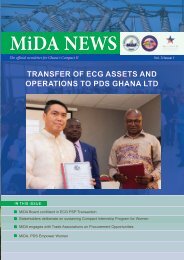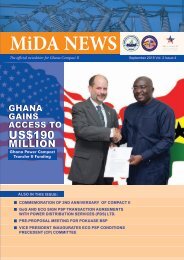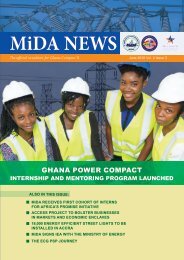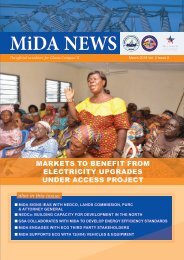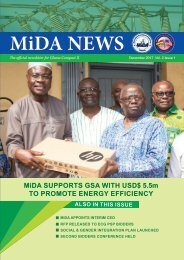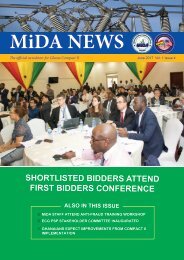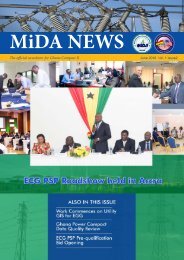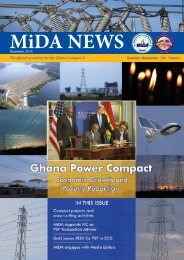MiDA Newsletter Vol1 Issue 3
Create successful ePaper yourself
Turn your PDF publications into a flip-book with our unique Google optimized e-Paper software.
Millennium Development Authority<br />
Quarterly <strong>Newsletter</strong> Vol. 1 <strong>Issue</strong> 3<br />
<strong>MiDA</strong> NEWS<br />
.<br />
The official newsletter for Ghana Compact II<br />
December 2016 Vol.1 <strong>Issue</strong>3
Millennium Development Authority<br />
Quarterly <strong>Newsletter</strong> Vol. 1 <strong>Issue</strong> 3<br />
CONTENTS<br />
Ghana Hosts MCC CEO, Dana Hyde...................................................................3<br />
Role of the Reform Unit in Compact II Implementation......................................5<br />
Economic Policy Mgt Students share thoughts on Compact Program.................6<br />
<strong>MiDA</strong> engages stakeholders at WAMPOC/WAMPEX.........................................7<br />
Environmental and Social Performance................................................................8<br />
<strong>MiDA</strong> / MCC Implementation Workshop (Event in Pictures)..............................9<br />
SGIP Consultant Meets <strong>MiDA</strong> Staff...................................................................10<br />
Pre-proposal Meetings on Tariff Study & Plan and PMC Consultancy..............11<br />
2
Ghana hosts MCC CEO, Dana Hyde<br />
The CEO of the Millennium Challenge Corporation,<br />
MCC, has visited Ghana with a team of<br />
MCC staff as part of a West African tour of MCC<br />
partner countries. The team arrived in Ghana on<br />
27th October, 2016 for two days following visits<br />
to Benin, Sierra Leone and Liberia.<br />
In Ghana, Ms Hyde met with Vice President Paa<br />
Kwesi Amissah-Arthur at the Flagstaff House in<br />
Accra. H.E. Amissah-Arthur reiterated the Government<br />
of Ghana’s commitment to the Compact<br />
Programme and pledged their support to ensure<br />
successful implementation of the various projects<br />
under the programme. The Vice President<br />
also acknowledged that the visit of Ms Hyde<br />
signified the continued friendship between the<br />
people of Ghana and the people of the United<br />
States of America.<br />
Ghana is receiving<br />
US$498.2 million<br />
from the MCC to<br />
implement various<br />
projects aimed at<br />
reforming as well<br />
as building and improving<br />
infrastructure<br />
in Ghana’s<br />
power sector. The<br />
Compact grant to<br />
Ghana is the largest<br />
U.S. Government<br />
Power Africa<br />
transaction to date, and one that is expected to<br />
catalyze billions of dollars in private investment<br />
in the power sector.
Millennium Development Authority<br />
Events in Pictures<br />
Quarterly <strong>Newsletter</strong> Vol. 1 <strong>Issue</strong> 3<br />
4
Millennium Development Authority<br />
Quarterly <strong>Newsletter</strong> Vol. 1 <strong>Issue</strong> 3<br />
ROLE OF THE REFORM UNIT IN<br />
COMPACT II IMPLEMENTATION<br />
Reforming and restructuring<br />
the power sector is a Government<br />
of Ghana objective that requires<br />
to be fully realized. Fortunately, the<br />
Ghana Power Compact embodies a reform<br />
agenda for the energy sector and<br />
advances a set of reforms that began in the 1990s.<br />
Given the importance of the reform program<br />
requiring support from the highest levels<br />
of Government, the Government is spearheading<br />
this reform agenda working closely<br />
with a Reform Unit that exists within <strong>MiDA</strong>.<br />
The Reform Unit is responsible for developing<br />
a strategy to implement the proposed reform<br />
activities within the program; facilitating its<br />
implementation; and establishing a review process<br />
to regularly<br />
evaluate progress on key items in the reform<br />
agenda.<br />
The Reform Unit works closely with government<br />
institutions and agencies to drive the dayto-day<br />
implementation of the proposed reforms<br />
in the sector. They include the Ministries of<br />
Power, Finance, Justice and Attorney General,<br />
Petroleum, Energy Commission, Public Utilities<br />
Regulatory Commission (PURC), Electricity<br />
Company of Ghana (ECG) and Northern<br />
Electricity Distribution Company (NEDCo).<br />
In fulfilling this strategic role, the Reform Unit<br />
performs the following functions:<br />
• Acts as a principal liaison between <strong>MiDA</strong> and<br />
other line ministries including<br />
- developing strategies;<br />
- writing background documents;<br />
- writing policy notes and updates; and<br />
- compiling and evaluating<br />
data.<br />
- Identifies and assesses<br />
economic, social<br />
and<br />
political trends and<br />
advises management;<br />
- Provides strategic<br />
guidance and support<br />
to ensure efficient<br />
coordination with<br />
stakeholders through<br />
- mapping entry points for policy dialogue;<br />
- analyzing impacts of reforms;<br />
- developing appropriate communications<br />
strategies;<br />
-working in close coordination with other <strong>MiDA</strong><br />
staff; and<br />
- building, maintaining and leveraging relation<br />
ships.<br />
• Identifies capacity gaps in relevant institutions<br />
and contributes to the planning and<br />
delivery of technical assistance;<br />
• Represents <strong>MiDA</strong> in meetings with donors;<br />
• Represents <strong>MiDA</strong> in public forums with<br />
respect to the reform activities;<br />
• Works with other Directorates of <strong>MiDA</strong> to<br />
achieve the organization’s goals by<br />
- developing implementation plans for ECG<br />
and NEDCo PSP activities;<br />
- providing a second line of tracking of delivery<br />
timelines; and<br />
- coordinating consultants for harmonious<br />
delivery.<br />
5
Millennium Development Authority<br />
Quarterly <strong>Newsletter</strong> Vol. 1 <strong>Issue</strong> 3<br />
ECONOMIC POLICY MANAGEMENT<br />
STUDENTS SHARE THOUGHTS ON POWER<br />
COMPACT PROGRAM<br />
Despite a looming heavy downpour, several<br />
students enrolled in the Master of<br />
Arts (MA) in Economic Policy Management<br />
(EPM) Programme, run by the Department<br />
of Economics at the University of Ghana (UG),<br />
turned up for an evening engagement with Ing.<br />
Owura Kwaku Sarfo. The <strong>MiDA</strong> CEO had been<br />
invited by the Department to speak on “The role<br />
of <strong>MiDA</strong> Compacts in Ghana’s Economic Development”<br />
as part of a Seminar Lecture Series organised<br />
for the MA EPM Programme.<br />
Ing. Sarfo delivered a forty minute presentation,<br />
which highlighted the relationship between<br />
power consumption and a country’s economic<br />
development. The presentation also explained<br />
the Power Compact, listed the various projects<br />
under the Programme and made clear the rationale<br />
for the ECG PSP activity. Following the<br />
presentation, the students had the opportunity<br />
to ask questions. Among the many asked, students<br />
particularly wanted to know the possibility<br />
of tariff increases in power consumption<br />
after a concessionaire takes over the operations,<br />
management and investments in ECG. Students<br />
were assured that the concession arrangement<br />
would not automatically yield tariff increments<br />
as speculated in the media, but could rather lead<br />
to reductions should losses within the power<br />
distribution system be considerably reduced.<br />
The students were also told about the requirement<br />
for Ghanaian participation (local content)<br />
in the ownership and management structure for<br />
the concessionaire to qualify for the PSP transaction.<br />
Dr Edward Nketiah-Amponsah, Seminar Coordinator<br />
and Senior lecturer at the Department of<br />
Economics- UG, said the meeting was one of the<br />
best attended in the Series. He was impressed<br />
that several students showed up for the event<br />
notwithstanding the unfavourable weather conditions.<br />
He mentioned that the presentation had<br />
been relevant to the students considering recent<br />
discussions in the Ghanaian media about the<br />
Power Compact, particularly the ensuing debate<br />
over Privatisation and PSP in the ECG. The<br />
presentation, Dr Nketiah-Amponsah said "will<br />
enhance the ability of our students to appreciate<br />
what <strong>MiDA</strong> does.”<br />
Samuel Afedu, a student enrolled in the programme,<br />
reiterated that the presentation was<br />
insightful and uncovered a lot of issues he did<br />
not understand for which he now has better understanding.<br />
“The debate has been going on but<br />
a lot of the information is just scattered so we<br />
are a bit confused. The issue of Ghana’s electricity<br />
is very important because it hinges on how<br />
this country can develop. We cannot develop<br />
without electricity. This presentation has made<br />
it clear that there is a problem that can easily be<br />
solved, when we address the institutional bottlenecks[and<br />
other challenges]” he said.<br />
On her part, Akua Esabbah Mohinson believed<br />
that the engagement had been enlightening.<br />
Specifically, it had helped her identify projects<br />
to which the Compact Grant is to be used and<br />
others that had been implemented with Compact<br />
I funds. “The presentation has helped me<br />
appreciate the importance of communication in<br />
policy management. I have come to realise that<br />
effective stakeholder communication is an important<br />
aspect of policy management.” She added.<br />
6
Millennium Development Authority<br />
Quarterly <strong>Newsletter</strong> Vol. 1 <strong>Issue</strong> 3<br />
<strong>MiDA</strong> ENGAGES STAKEHOLDERS<br />
AT WAMPOC/WAMPEX IN ACCRA<br />
Various officials of <strong>MiDA</strong> took turns to<br />
engage with participants at this year’s<br />
West African Mining and Power Conference<br />
and Exhibition (WAMPOC/WAMPEX)<br />
held 1st-3rd June, 2016 in Accra. The 12th Annual<br />
event, hosted at the Accra International<br />
Conference Centre was attended by various organisations<br />
in the power and mining industries,<br />
academia and other stakeholders.<br />
Mr Mawunyo Rubson, Director of Generation<br />
Projects, gave a presentation titled The Ghana<br />
Power Compact: Powering Ghana for Accelerated<br />
and Sustainable Economic Growth at<br />
the Power Conference, which was held on the<br />
second day of the three day event. Mr Rubson,<br />
highlighted the economic benefits sought under<br />
the Power Compact to both mining industry<br />
and the country at large.<br />
Participants, exhibitors<br />
and visitors who<br />
stopped at <strong>MiDA</strong>’s<br />
booth at the exhibition<br />
were attended to<br />
by various <strong>MiDA</strong> officials<br />
from the Communication<br />
and Outreach<br />
Unit, supported<br />
by project officers<br />
engaged on the ECG<br />
Financial and Operational<br />
Turnaround<br />
project.<br />
The exhibition provided <strong>MiDA</strong> an opportunity<br />
to have one on one engagements with Ghanaians,<br />
and other stakeholders on the Power Compact.<br />
7
Millennium Development Authority<br />
Quarterly <strong>Newsletter</strong> Vol. 1 <strong>Issue</strong> 3<br />
ENVIRONMENT AND SOCIAL<br />
PERFORMANCE<br />
<strong>MiDA</strong> recognizes the value in ensuring<br />
that projects and activities under the<br />
Power Compact are designed and implemented<br />
in an environmentally and socially<br />
sound manner. Projects and activities under<br />
the Compact will be designed and implemented<br />
consistent with the applicable environmental<br />
and social laws of Ghana including but not<br />
limited to the Environmental Protection Agency<br />
Laws and Regulations, EPA (Act 490, 1994),<br />
Ghana Environmental Assessment Regulation<br />
(LI 1652, 1999) as amended (2002) and the International<br />
Finance Cooperation (IFC) Performance<br />
Standards on Environment and Social<br />
Sustainability.<br />
The IFC Performance Standards on Environmental<br />
and Social Sustainability are a set of<br />
international benchmarks for identifying and<br />
managing environmental and social risks and<br />
impacts. They promote smarter and more sustainable<br />
economic development by helping institutions<br />
promote economic development that<br />
is environmentally and socially sustainable,<br />
promote accountability and transparency, and<br />
manage risks and do business in a sustainable<br />
way. MCC recently amended its Environmental<br />
Guidelines to formally adopt the IFC Performance<br />
Standards. There are eight performance<br />
standards (PS):<br />
• PS1 Assessment and Management of Environmental<br />
Risks and Impacts: identifying and<br />
managing social and environmental risks and<br />
impacts.<br />
• PS2 Labor and Working Conditions: addressing<br />
the four core labor standards and promoting<br />
the health safety and fair treatment of<br />
workers.<br />
• PS3 Resource Efficiency and Pollution Prevention:<br />
avoiding pollution from the project<br />
activities, promoting efficient use of resources<br />
and reducing greenhouse gas emissions.<br />
• PS4 Community Health, Safety and Security:<br />
managing risks to local communities.<br />
• PS5 Land Acquisition and Involuntary Resettlement:<br />
protecting<br />
and improving the<br />
livelihoods of displaced<br />
persons when<br />
resettlement is unavoidable.<br />
• PS6 Biodiversity<br />
Conservation and<br />
Sustainable Management<br />
of Natural Living<br />
Organisms: protecting<br />
biodiversity<br />
and managing living<br />
natural resources sustainably.<br />
• PS7 Indigenous People: protecting the dignity,<br />
human rights, aspirations, cultures, and<br />
customary livelihoods of indigenous peoples.<br />
• PS8 Cultural Heritage: protecting cultural<br />
heritage from adverse impacts and supporting<br />
its preservation.<br />
PS1 underscores the importance of developing<br />
and managing environmental and social<br />
risks and impacts within the life of a project.<br />
<strong>MiDA</strong> has developed and Environmental and<br />
Social Management System (ESMS) for managing<br />
environmental and social risks and impacts<br />
for projects and activities within the Compact.<br />
<strong>MiDA</strong> ESMS is the means by which <strong>MiDA</strong> and<br />
partners identify and manage environmental<br />
and social risks and opportunities. Doing so results<br />
in smarter and more sustainable economic<br />
development. The ESMS eight (8) key elements<br />
include the following:<br />
- Policy,<br />
- Legal and Regulatory Requirements<br />
- Identification of risks and Impacts<br />
- Management Programs<br />
- Organizational capacity and Competence<br />
- Emergency Preparedness and Response Plan<br />
- Stakeholder Engagement<br />
- Monitoring and Review<br />
In addition, <strong>MiDA</strong> has developed the following documents<br />
which are integral to the ESMS. These include<br />
the following;<br />
- Health Safety Policy and Procedures,<br />
- Emergency Preparedness and Response Plan,<br />
- Stakeholder Engagement Plan, and<br />
- Resettlement Policy Framework.<br />
8
Millennium Development Authority<br />
Quarterly <strong>Newsletter</strong> Vol. 1 <strong>Issue</strong> 3<br />
<strong>MiDA</strong> / MCC<br />
IMPLEMENTATION WORKSHOP<br />
11th-15th July, 2016<br />
Event in pictures<br />
9
Millennium Development Authority<br />
Quarterly <strong>Newsletter</strong> Vol. 1 <strong>Issue</strong> 3<br />
SGIP Consultant Meets <strong>MiDA</strong> Staff<br />
The consulting agency engaged to develop<br />
the Social Gender and Inclusion Plan<br />
(SGIP) for the Compact II program has<br />
met with the executives and staff of <strong>MiDA</strong> to<br />
get acquainted with the team. The Consultant,<br />
Women Influencing Health, Education, and<br />
Rule of Law- WI-HER, was represented by its<br />
team leader Madam Vivian Sarpomaa Fiscian.<br />
At a short meeting with <strong>MiDA</strong>, held at the<br />
<strong>MiDA</strong> Board Room, Madam Fiscian said she<br />
was pleased to meet the team and stressed her<br />
organisation’s preparedness to start their work<br />
on the SGIP. She also explained that the consultant’s<br />
work would involve meetings with Project<br />
Managers and some directors at <strong>MiDA</strong>, as<br />
well as other key officials working at the various<br />
Implementing Entities.<br />
CEO Ing. Owura Sarfo welcomed Madam Fiscian<br />
on behalf of the <strong>MiDA</strong> team. He stressed<br />
that the work of the consultant was critical to<br />
achieving the objectives of the Power Compact<br />
and hoped that their work would help people<br />
understand and appreciate why gender is at the<br />
heart of the Compact II Projects.<br />
WI-HER is a woman-owned small business<br />
delivering expert and state-of-the-art practical<br />
and workable solutions to complex problems.<br />
The organisation has field experience working<br />
with women and youth, orphans and vulnerable<br />
children, hard-to-reach groups, and those in<br />
areas of conflict in Africa, Eastern Europe, Latin<br />
America and the Middle East.<br />
10
Millennium Development Authority<br />
Quarterly <strong>Newsletter</strong> Vol. 1 <strong>Issue</strong> 3<br />
<strong>MiDA</strong> Holds Pre-proposal Meetings<br />
for Tariff Study & Plan Consultancy, and<br />
Program Management Consultancy (PMC)<br />
A<br />
pre-proposal meeting has been held for<br />
bidders interested in the Tariff Methodology<br />
Study activity, one of several activities<br />
under the Regulatory Strengthening and<br />
Capacity Building Project and also for the Program<br />
Management Consultancy for the Ghana<br />
Power Compact. The meetings are part of efforts<br />
to ensure that bidders submit good bids for<br />
procurement opportunities in the Compact.<br />
Pre-proposal Meeting for<br />
Tariff Study and Tariff Plan Consultancy<br />
11
Millennium Development Authority<br />
Quarterly <strong>Newsletter</strong> Vol. 1 <strong>Issue</strong> 3<br />
Sita Corp, a global player in the development of IT Software solutions, on January 18 2016, officially<br />
handed over an SAP software it has been developing for the Ghana Power Compact Programme to<br />
<strong>MiDA</strong>. Millennium A short Development handing over ceremony Authority was organised by Sita Corp at <strong>MiDA</strong> Board Room, to commemorate<br />
4th the Floor, handover. Heritage The Tower, ceremony demonstrated that Sita Corp had fulfilled its obligations with the<br />
development Liberation of the Road, programme Ambassadorial and had handed Plazaover a clean and working system to <strong>MiDA</strong>. Mr John<br />
Boakye, Ridge Chief Finance West, Accra. Officer (CFO) at <strong>MiDA</strong> in a handshake with Srinivas Jinka, Project Manager on the<br />
project acknowledged the handover.<br />
Sita Corp Postal has more Address than 20 years of experience offering SAP implementation and services to organisations<br />
in various Private industries Mail such Bag as 56consumer goods, manufacturing, financial services, retail and public sector.<br />
Stadium Post Office Accra<br />
Following the ceremony, <strong>MiDA</strong> News (MN) had a chat with Srinivas Jinka (SJ), to find out more about the<br />
SAP programme and its usefulness to the Compact.<br />
Email:<br />
MN: Hello info@mida.gov.gh<br />
and welcome. Can you explain what the SAP PROGRAMME is?<br />
SJ: SAP is a Management Information System (MIS) software. What we developed is the SWIFT Solution<br />
(SOFTWARE Website: IMPLEMENTATION FAST TRACK) which is used by all major fortune 400 companies in<br />
the world. www.mida.gov.gh<br />
The programme is tailored for Compacts and has been used in the Malawi, Zambia and Indonesia<br />
Compacts. Ghana is the fourth Compact nation to implementation of the programme.<br />
MN: What Telephone: is the benefit of using the SAP?<br />
SJ: The +(233) very good 302 benefit 666619 of having the SWIFT Solution is budgetary control, i.e. keeping track of how you<br />
are spending +(233) money. 302 666621 It helps ensure that projects stay within budgets and within project time.<br />
+(233) 302 666624<br />
The programme will thus help <strong>MiDA</strong> manage its spending on the various projects; ascertain what they<br />
are spending on, and how they are spending. The programme will also help <strong>MiDA</strong> to produce reports to<br />
send to Fax: MCC. SAP will capture the activities in the projects, allow the project managers to plan costs, give<br />
projections +(233) on how 302 much 666579 project activities cost, and take approvals. It can also assist manage project sub<br />
activity tracking. SAP will help track project milestones, expenditure and reporting.<br />
MN: Are there other benefits aside managing project spending?<br />
SJ: The solution would provide transparent procurement processes. A project manager can use the system<br />
to identify procurements already started, those initiated but not started and the stages these projects are.<br />
MN: Who will use the sap?<br />
SJ: The programme will be primarily used by the Fiscal Agent and Procurement Agent of <strong>MiDA</strong>. The other<br />
users will be project directors, and the Finance and management personnel.<br />
MN: How would sap affect or improve <strong>MiDA</strong>’s relationship project contractors?<br />
SJ: A major benefit would be payments due contractors. The tracking component of the programme helps<br />
to track payments due contractors. Once contractors honour their deliverables SAP will notify <strong>MiDA</strong> of<br />
due payments to contractors based on their payment schedule. If everything is good, contractors should<br />
not have any problems and payments would happen in a timely fashion.<br />
MN: How long has it taken to train users of the program?<br />
SJ: There was two weeks of training for the <strong>MiDA</strong> personnel. This was completed in December 2015. We<br />
have had a week, after the training, to test the systems functionality. During the period, we dedicated<br />
sometime to capture historical data. There is always a learning curve. I would say it take about 2-3 months<br />
to use the solution.<br />
MN: What will be your final words?<br />
SJ: The way other compacts have benefitted. It will make life easy for you. Do not keep anything pending.<br />
It takes time to learn but once you start capturing all the information and completed it will be just a click<br />
of a button. Using SAP efficiently will capture all the information needed for the users.<br />
12




